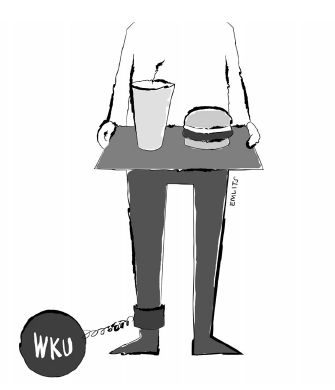EDITORIAL: Students should eat on their own terms
October 21, 2014
The issue: WKU’s meal plans make students waste money.
Our stance: Students need to let WKU know the problems with campus dining.
very Sunday night, the Hill’s dining facilities are flooded with a swarm of students just trying to get their money’s worth.
Some of them spent the weekend at home visiting family and returned to campus in time to grab a bite to eat before going to bed in preparation for their morning classes. Unfortunately, many have five or six meals left and they can only use four.
A meal swipe at WKU is the equivalent of $3.45. Freshmen are required to have a meal plan. The smallest plan available to them is 10 meals a week, and it has a $1,137 price tag per semester.
WKU uses this system to act as a sort of guardian budgeting system. The weekly limit protects students from using all of their meals in the beginning of the semester, and the daily limit prevents their usage early in the week. Gary Meszaros, assistant vice president of Auxiliary Services, confirmed that WKU is essentially acting as a stand-in parent.
“We guarantee the parent, when they leave their student here on campus, that they’re going to have a meal,” he said. “That they won’t run out by using them too fast.”
The problems with campus dining are obvious to students. Every student has to face the struggles during their freshman year. WKU has used the same system since 1992 — before many of today’s students were even born.
But it doesn’t have to stay this way.
WKU keeps its current system because it makes money. Funding for expansions to dining options comes from last year’s profits, according to Meszaros. Steak ’n Shake was funded from last year’s surplus sales.
“We’re flexible,” Meszaros said. “If another plan is more popular, then our role is to sell what people want to buy.”
Meal plans work for plenty of students. Because so many students buy a plan, as far as WKU is concerned, a change isn’t needed. But this interpretation is missing the perspective of freshman forced to endure a year of wasting cash.
An easy solution would be offering a block-style meal plan to all students on campus — not as a replacement, but simply an alternative. Students and parents worried about their young adult’s budgeting ability could still buy a restrictive plan, but students with a tight budget wouldn’t have to worry about throwing away a few bucks anytime their meals failed to rollover.
Ideally, meal plans wouldn’t be required for anyone. Between the difficulty of finding vegetarian options, the absence of food every holiday weekend and the obvious health implications of a diet supported by fast food restaurants, there’s enough problems to give anyone a headache. But the fact is that WKU isn’t going to make a change that will result in lost income on their end.
If mandatory meal plans are unavoidable, students should at least demand that they’re structured their way.
This is a policy that could change very easily. WKU just wants to sell enough food. If students express their desire to buy it in a different manner, why wouldn’t they change?
Students who want to change how WKU eats can write in to [email protected] to voice their opinion. Also consider sending word to Meszaros at [email protected].





















